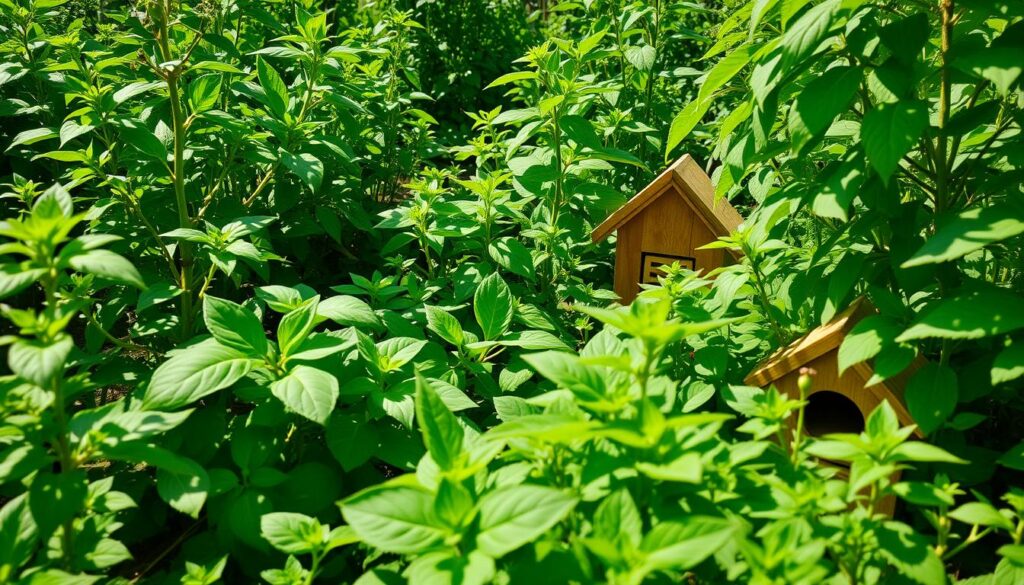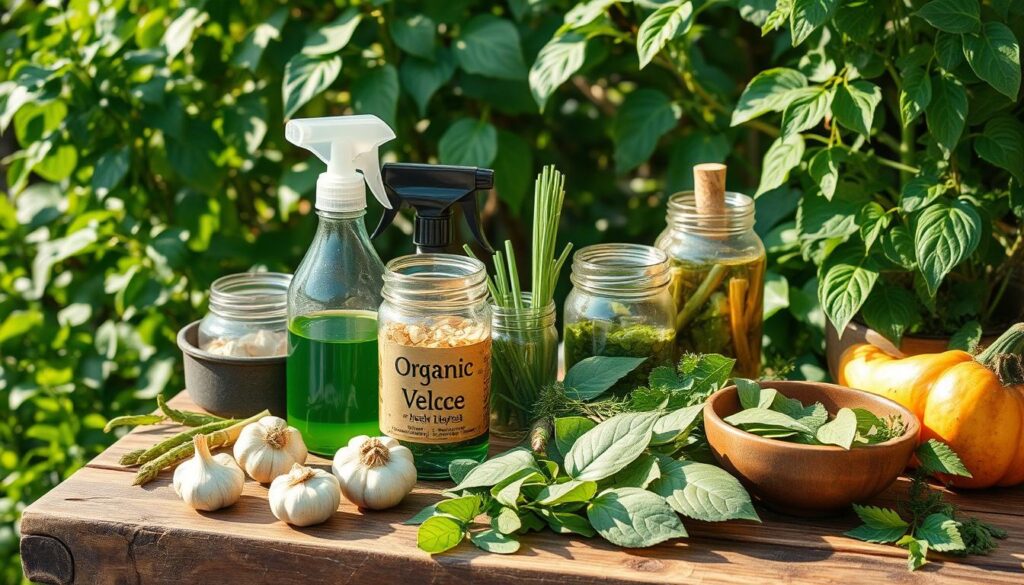Growing a vibrant, productive vegetable garden is more than just planting and watering. It’s also about managing pests well. This guide will show you how to use organic pest control to keep your garden healthy and free from chemicals.
Key Takeaways
- Organic pest control methods are essential for maintaining a healthy, chemical-free vegetable garden
- Understanding the importance of a balanced garden ecosystem is key to effective natural pest management
- Identifying common garden pests and their natural predators is the first step in developing an organic pest control strategy
- Organic pest control techniques like biological control, cultural practices, and natural repellents can be highly effective
- Encouraging beneficial insects and creating a pest-resistant garden through companion planting and crop rotation are important strategies
Understanding Organic Pest Control
Organic pest control uses natural, non-toxic ways to manage pests in gardens. It aims to create a balanced, healthy garden ecosystem. This encourages beneficial insects and keeps pests away. By focusing on a thriving garden, you can use eco-friendly gardening methods. These methods work with nature, not against it, unlike harsh chemical pesticides.
What is Organic Pest Control?
Organic pest control uses natural pest management to keep pests away from gardens. It involves introducing predatory insects and using natural repellents. It also includes cultural practices that help a diverse and strong garden ecosystem. The goal is to keep pests in check without using synthetic pesticides.
Importance of a Healthy Garden Ecosystem
- Supports a diverse range of beneficial insects that prey on or deter common garden pests.
- Encourages a natural balance between different organisms, preventing any single species from becoming dominant.
- Improves soil health, which in turn strengthens the overall organic pest control methods in the garden.
- Enhances the overall resilience and productivity of the garden, promoting healthy plant growth.
“By understanding the delicate balance of a healthy garden ecosystem, we can adopt natural pest management strategies that work in harmony with nature, rather than against it.”
Identifying Common Garden Pests
Starting with organic pest control means knowing the common pests that harm your garden. Spotting pest signs helps you use the right organic methods. This keeps your garden healthy and full of life.
Some top common garden pests are:
- Aphids: Small, soft insects that suck plant sap, causing leaves to curl.
- Slugs and snails: Leave trails and eat holes in leaves and veggies.
- Caterpillars: Eat leaves and fruits, and can damage plants a lot.
- Beetles: Some, like the Colorado potato beetle, harm crops a lot.
Knowing how to identify pests is key to using the best organic pest control solutions. By knowing your pests, you can fight them in the best way.
| Pest | Identifying Characteristics | Damage Caused |
|---|---|---|
| Aphids | Small, pear-shaped insects, often in clusters, ranging in color from green to black or red. | Suck plant sap, causing leaves to curl, wilt, and discolor. |
| Slugs and Snails | Slimy, shell-bearing creatures that leave behind shiny trails on leaves and soil. | Chew holes in leaves, stems, and vegetables, often targeting young, tender growth. |
| Caterpillars | Soft-bodied larvae of various moth and butterfly species, ranging in color and size. | Defoliate plants, bore into fruits and vegetables, and can cause significant crop damage. |
| Beetles | A diverse group of insects, often with hard, wing-like covers, varying in size and color. | Feed on leaves, stems, and even fruits and vegetables, potentially causing severe damage to plants. |
Knowing the common garden pests in your garden helps you act fast. You can spot and stop pest problems early. This keeps your garden healthy and growing well.
Organic Pest Control Methods for a Healthy Vegetable Garden
To keep your vegetable garden healthy, you need a good pest management plan. Organic pest control uses natural methods like biological and cultural practices. These methods work well together and don’t harm the environment. By using these organic ways, you can keep your garden healthy and full of life without using harsh chemicals.
Biological Control Methods
Biological control means using natural predators and beneficial insects to fight pests. It uses the garden’s ecosystem to control pests. Here are some key biological control techniques:
- Introducing ladybugs, lacewings, and parasitic wasps to target aphids, mealybugs, and other common garden pests
- Encouraging the presence of spiders, birds, and other wildlife that prey on pests
- Planting flowers and herbs that attract beneficial insects, providing them with food and shelter
Cultural Control Practices
Cultural control focuses on making your garden less welcoming to pests. It helps your garden stay healthy and your plants grow well. Here are some effective cultural control practices:
- Crop rotation to disrupt pest life cycles and prevent the buildup of pests in specific areas
- Mulching around plants to suppress weed growth and reduce hiding places for pests
- Maintaining good garden hygiene by regularly removing dead or damaged plant material
- Introducing companion plants that repel or distract pests, such as marigolds, basil, or chrysanthemums
Using both biological and cultural control methods can make your garden healthy. With patience and a bit of trial and error, you can create a balanced garden. Here, pests are naturally kept in check, and your plants can flourish.

Creating a Pest-Resistant Garden
Designing a pest-resistant garden is key to organic pest control. By planning your garden layout and using techniques like companion planting and crop rotation, you can keep pests away. This helps your plants stay healthy.
Companion Planting
Companion planting means growing different plants together for their benefits. For example, marigolds can keep aphids and nematodes away from your veggies. Also, herbs like basil and dill attract beneficial insects that eat pests.
Crop Rotation
Crop rotation helps your garden fight pests. By changing where you plant, you break pests’ life cycles and prevent soil diseases. It also keeps the soil fertile and balanced for plants.
“Companion planting and crop rotation are two powerful tools in the organic gardener’s toolbox for creating a pest-resistant garden and promoting healthy plant growth.”
Using companion planting and crop rotation in your garden makes it pest-resistant. This way, your veggies will grow well and be productive.
Natural Pest Repellents
Natural pest repellents are a big help for a healthy vegetable garden. They use plant-based ingredients like essential oils. This way, you can keep pests away without using harsh chemicals.
Using natural pest repellents is key for organic pest control. They protect your crops and keep the garden healthy. This is because they avoid synthetic pesticides.
Essential Oils for Pest Control
Essential oils from plants are great at keeping pests away. Some top oils for organic pest deterrents are:
- Peppermint oil: Keeps aphids, spider mites, and ants away
- Lemongrass oil: Keeps mosquitoes, fleas, and ticks off
- Lavender oil: Repels moths, flies, and mosquitoes
- Rosemary oil: Keeps cabbage worms and carrot flies at bay
These natural pest repellents are easy to use in homemade pest control solutions. You can make sprays or sachets to protect your garden. This way, you keep your garden healthy and sustainable.
By using essential oils for pest control, gardeners can keep their gardens pest-free. This also helps create a balanced, eco-friendly environment.
Homemade Organic Pesticides
Homemade organic pesticides are great for fighting pests in your garden. They are safe for your plants and the environment. Two good choices are neem oil spray and garlic and pepper spray.
Neem Oil Spray
Neem oil comes from the neem tree and is a natural bug killer. It stops insects from reproducing, making it good against many pests. Plus, it’s safe for your plants and doesn’t leave harmful chemicals behind.
Garlic and Pepper Spray
A garlic and pepper spray is another organic option. Mix garlic, red pepper flakes, and water to make a strong spray. It keeps away aphids, whiteflies, and some caterpillars.
| Homemade Organic Pesticide | Target Pests | Effectiveness |
|---|---|---|
| Neem Oil Spray | Aphids, Mealybugs, Spider Mites | High |
| Garlic and Pepper Spray | Aphids, Whiteflies, Caterpillars | Moderate to High |
Using these homemade organic pesticides can make your garden healthy and pest-free. It’s a green way to keep your garden safe and thriving.

“Organic pest control solutions are not only better for the environment, but they can also be just as effective as their synthetic counterparts.”
Encouraging Beneficial Insects
Organic gardening is all about a healthy ecosystem balance. Beneficial insects like ladybugs, lacewings, and wasps are key. They eat common pests, keeping your garden balanced and reducing chemical use.
Attracting Pollinators
Bees and butterflies are also important for your garden. Planting pollinator-friendly plants creates a welcoming space for them. This helps with pollination, boosting your garden’s health and productivity.
- Choose a variety of blooming flowers, herbs, and plants that offer nectar and pollen throughout the growing season.
- Avoid the use of synthetic pesticides and opt for natural pest control methods to protect the beneficial insects.
- Provide a reliable source of water, such as a shallow birdbath or dripping faucet, to support the pollinators.
By welcoming beneficial insects and pollinators, your organic garden becomes strong against pests. It supports a balanced natural pest control ecosystem.
“A healthy, diverse garden ecosystem is the foundation for effective organic gardening and natural pest control.”
| Beneficial Insects | How They Help |
|---|---|
| Ladybugs | Consume aphids, mealybugs, and other soft-bodied pests |
| Lacewings | Prey on aphids, thrips, and other small insects |
| Predatory Wasps | Parasitize and kill caterpillars, beetle larvae, and other garden pests |
Maintaining a Healthy Garden
To have a pest-free vegetable garden, you need to keep up with gardening practices. This means watching your plants for pests and making sure the soil and water are right. These steps help your garden stay healthy and avoid pests.
Observation is key in healthy garden maintenance. Check your plants often for pests or diseases. Catching problems early helps you fix them before they get worse. Also, using organic gardening practices like proper watering and weeding helps keep pests away.
Soil health is also vital for a pest-free vegetable garden. Make sure your soil is full of organic matter and nutrients. You can add compost or natural soil amendments to do this. Healthy plants are stronger against pests and diseases.
| Gardening Practice | Benefits |
|---|---|
| Regular Plant Monitoring | Early detection of pests and diseases |
| Proper Watering and Pruning | Promotes plant health and vigor |
| Organic Soil Amendments | Improves soil fertility and structure |
By using these sustainable gardening practices, you can have a pest-free vegetable garden that grows well every year. Remember, taking care of your garden is a continuous job. But the joy of growing your own food is worth all the effort.
Conclusion
By using organic pest control, I can grow a lively, productive vegetable garden. I use natural methods like biological and cultural controls. I also make my own organic pesticides.
This way, I keep my garden healthy and balanced. I get lots of food while being kind to the planet.
Organic pest control is good for more than just my garden. It helps me live without chemicals and supports sustainable living. It keeps the garden’s ecosystem in balance.
By choosing these eco-friendly methods, I help make the world a better place. I’m doing it for myself and for my community.
I’m excited to keep my garden growing with these organic pest control tips. I’m not just growing food. I’m learning to appreciate the life that makes my garden thrive.



Leave a Reply